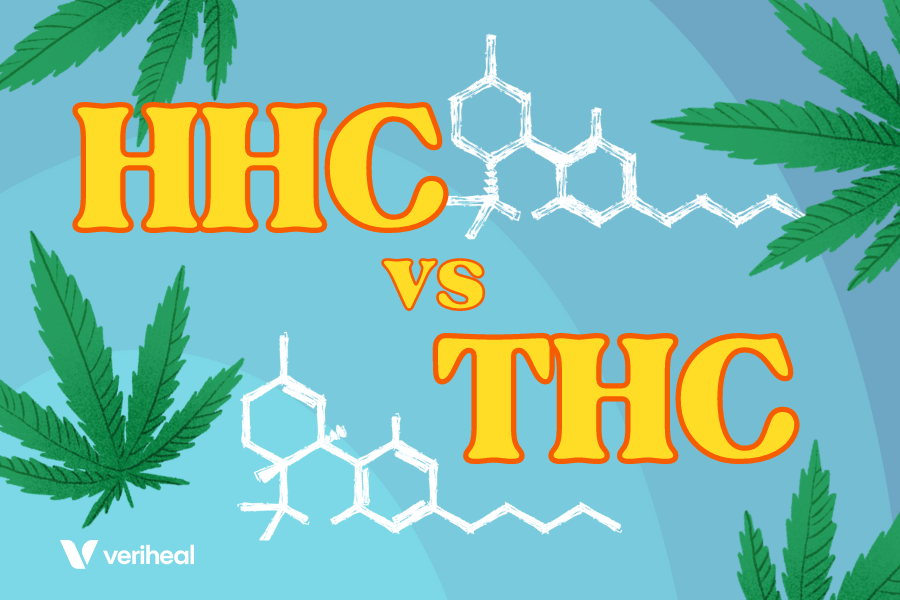The cannabis industry has been captivated by the emergence of novel and underexamined cannabinoids in recent years, including CBN, CBG, and Delta-8 THC. And thanks to the Farm Bill of 2018 which legalized hemp-derived cannabis products with less than 0.3% THC, synthesized isolates containing these cannabinoids and derived from the hemp plant have boomed in popularity. One cannabinoid that has received increasing attention since 2021 is called hexahydrocannabinol, or HHC. With only one letter difference, the name seems strikingly similar to the more familiar THC, but there are notable differences of HHC vs. THC between the compounds in terms of production, therapeutic effects, established research, and legal status.
Where Does HHC Come From?
To understand HHC vs. THC, it’s first essential to understand how HHC is formed.
Hexahydrocannabinol (HHC) and tetrahydrocannabinol (THC) are two psychoactive compounds that come from the cannabis plant, cannabis Sativa L. Unlike delta-9 THC, which is abundant in cannabis flowers, HHC is only found in trace amounts, so HHC is largely sourced from synthesis in the laboratory.
Although HHC’s popularity is emerging in the cannabis industry, having hit the US cannabis market in 2021, the compound was first discovered in the 1940s when it was produced in a lab by chemist Roger Adams, when Adams bound hydrogen atoms to the THC molecule.
Since then, knowledge of how to produce higher concentrations HHC has grown. The synthesizing process involves adding hydrogen to THC or cannabidiol (CBD) molecules by a process called hydrogenation, which is also used by the food industry to make certain oils solid at room temperature or to increase products’ shelf-life.
There are high- and low-potency HHC molecules that result from the hydrogenation process. The high potency variety of HHC (9R HHC), which binds more effectively to the body’s endocannabinoid receptors, is virtually indistinguishable from the inactive version (9S HHC), so manufacturers currently face difficulties with differentiating between the two products.
How Do the Effects of HHC vs. THC Differ?
Since HHC is a less common cannabinoid, its effects are not as well-documented as THC’s, but HHC might produce similar benefits. HHC vs. THC have similar structures, except the carbon double bonds in THC are replaced with hydrogen in HHC. Because of the similarities between HHC and THC and their molecular structures, the mechanism of onset for HHC is thought to be similar to THC. When THC enters the body, it binds to cannabinoid1 (CB1) receptors in the brain, leading to the psychoactive effects. THC further interacts with cannabinoid2 (CB2) receptors, which are predominantly found in the immune system and peripheral tissues, to modify pain perception and inflammation.
The potent variation of the HHC molecule can bind to the same endocannabinoid receptors to induce effects comparable to THC. HHC is said to primarily act on CB1 receptors found throughout the brain and central nervous system. The stimulation of cannabinoid receptors produces euphoric highs, as well as the anti-inflammation, pain relief, and sleep-promoting benefits associated with cannabis use.
Effects of HHC products have been reported as longer-lasting—up to 12 hours—because it takes more time for the body to metabolize HHC than THC. However, a higher dose of HHC compared to THC is required to generate these effects, one of the main differences between HHC vs. THC. HHC’s effects have potential benefits for treating symptoms of many ailments, as HHC may help combat pain, inflammation, anxiety, and sleep dysfunction, but more scientific evidence is needed to verify the effects and potential therapeutic applications of this hemp-derived cannabinoid.
It is additionally important to note that THC is converted into certain metabolites as it is processed by the body, and since HHC possesses a distinct chemical structure from THC, the metabolites involved as HHC is processed by the body will differ from those associated with the processing of THC. This means that the hydrogenated cannabinoid compound may have a longer metabolic half-life and could bind to different receptors within the endocannabinoid system, ultimately producing different, though fairly similar effects.
Undesirable side effects of HHC generally appear only at high doses, much like delta-9 THC. Individuals will experience the cannabinoid’s effects differently, but in high doses, side effects of HHC are similar to the side effects of THC, and may include: heightened appetite, dry mouth, slowed reaction times, red eyes, and—at worst—anxiety and paranoia.
Why You Should Get Your Medical Marijuana Card
Veriheal has satisfied millions of patients nationwide by giving them access to these benefits
- Larger purchase limits
- Peace of mind
- Enhanced legal protection
- Access to higher potency strains
- Save up to 25% on cannabis purchases
- Skip the line at the dispensary
Are HHC and THC Regulated Differently?
HHC vs. THC are regulated very differently. As a relatively new compound, the legal status of HHC is not well-defined in many regions. The legality of HHC varies across jurisdictions within the United States and across the European continent. THC, on the other hand, is more extensively controlled and is classified as a Schedule I controlled substance in the U.S. and many other countries, with legal status across jurisdictions ranging from complete prohibition to decriminalization, to legal medical and/or recreational use. The differences in regulatory standards make HHC a possible alternative for patients without access to legal THC who would otherwise benefit from the therapeutic use of medicinal THC products. And, because this cannabinoid is structurally different, it is said to be undetectable in drug tests, though that fact is based only on anecdotal evidence.
As the scientific understanding of cannabinoid compounds continues to develop, it is important to stay informed about the latest research and local regulations when considering the use of new products. Overall, compared to the more familiar THC, HHC’s legality is less defined, and more research is needed to understand its effects fully. We know how HHC is synthesized through laboratory processes, and it has been suggested that HHC produces similar, but milder, effects to THC. Nevertheless, numerous uncertainties remain surrounding the compound, and more time and scientific investigation are required to obtain a better understanding of HHC’s safety, effects, and therapeutic benefits.
The scientific study of unfamiliar cannabinoids has the potential to improve the lives of many people suffering from a plurality of medical dysfunctions, and ongoing research involving previously unexamined substances like HHC provides further optimistic opportunities for the promotion of human wellness by enhancing our knowledge of the medicinal properties of the cannabis plant and other derivatives of popular cannabinoids, such as delta-10 THC and THCO.
HHC vs. THC Products
Just like THC, HHC products come in many forms. HHC concentrates often come in cartridges and disposable HHC vapes for those who prefer to vape, though waxes and other forms are a bit rarer. Most popular, perhaps, are HHC edibles, as many cannabis retailers produce HHC gummies and other forms of edibles. For those who prefer neither edibles nor vapes, HHC tinctures are also available.
Once again, thanks to the Farm Bill of 2018, these products are generally available in states where cannabis has yet to be legalized, even though cannabis is not legal on a federal level—as long as those hemp products contain 0.3% delta-9 THC or less.
Frequently Asked Questions
What is HHC?
HHC, or hexahydrocannabinol, is a psychoactive cannabinoid that can be processed from compounds found in legal hemp plants, like CBD and THC. For medical cannabis uesrs, HHC may help combat pain, inflammation, anxiety, and sleep dysfunction
Is HHC stronger than THC?
No, HHC generally has weaker effects when compared to THC in the same dose. HHC vs. THC may be ideal for medical cannabis patients who want stronger pain relief with lesser psychoactive effects.
Is HHC stronger than CBD?
Yes, HHC is stronger than CBD when it comes to psychoactive impact. Whereas CBD is not psychoactive and does not cause a high, HHC is psychoactive and will get you high. Compared to other psychoactive cannabinoids, anecdotal evidence suggests HHC is roughly 75% as strong as delta-9 THC.
Does HHC make you high?
Yes, HHC can get you high, as it is a psychoactive compound. Cannabis users must generally consume higher levels of HHC vs. THC.
Is HHC vs. THC different?
Yes, HHC is a hemp-derived cannabinoid that can be synthesized from naturally occurring cannabinoids. HHC generally has less strong effects than THC, but more psychoactive effects compared to CBD.
Note: Veriheal does not intend to give this as professional medical advice. Do not attempt to self-diagnose, or prescribe treatment based on the information provided on this page. Always consult a physician before making any decision on the treatment of a medical condition.
Author, Share & Comments
















